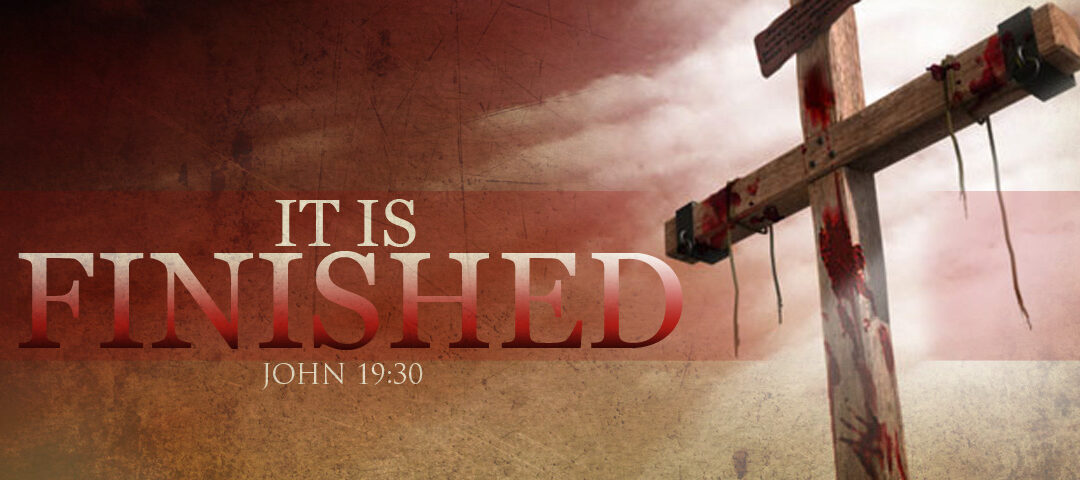“When Jesus therefore had received the vinegar, he said, It is finished: and he bowed his head, and gave up the ghost,” (John 19:30).
There is no way to comprehend everything Christ was experiencing in that moment when he breathed his last words, “It is finished.” Taken at face value in this present situation, we can conclude he means that his suffering is complete and can now give way to death. But considered in its greater context, Christ expounds on the meaning of this renowned phrase in his glorious prayer to the Father recorded in John 17 when he affirms, “I have finished the work which you gave me to do.”
That work, more comprehensively, would have encompassed certain other truths about his life. For example, he fully glorified the Father (John 17:4). He perfectly exemplified God to man (John 1). He fulfilled the Law and the prophets to the letter (Matt. 5:17-18). He resisted Satan head-to-head (Matt. 4:1-11). And at this moment in time, most pointedly, he is actively “giving eternal life to as many as the Father has given him,” (John 17:2).
When Christ breathed these final words, it was because he was now ready to give his life over to death. Despite how the situation appeared to all who were present that day, his enemies did not take his life from him. “No one takes it from me, but I lay it down of my own accord. I have authority to lay it down, and I have authority to take it up again. This charge I have received from my Father,” (John 10:18).
That he did not die little by little, fainting slowly away as others, is evidenced by the fact that immediately before his death he bowed his head and as Luke says, he cried out with a loud voice after which he presently gave up the ghost (Luke 23:46). Man did not give him his life, so it was not theirs to take. He willingly chose to give it. Without constraint, murmur, or regret, with no debt of his own nor desert of ours, he then bowed his head and died.
Judas betrayed him for gain, the Jews accused him through envy, Pilate condemned him for fear. Yet nothing caused his death apart from his love. For “greater love hath no man than this, that a man lay down his life for his friends,” (John 15:13).
Contemplations:
- You gave up your spirit, Lord, into the hands of your Father (Luke 23:46), as did David and Stephen. And so must I too, for you yourself have authorized this boldness in me to humbly charge your Father with my soul’s custody, “Father I will that those thou hast given me out of the world be with me where I am, for all mine are thine,” (John 17:24). If I am not willing to trust the Father with my soul while in this life, what rude and gross assumption would it be to commit my soul at last breath into his hands?
- As I must commend my spirit into your hands at death, so in life do you here commend your Spirit into mine. “You have received the Spirit of adoption,” (Rom. 8:15). Let me entertain your Spirit here with grace (Rev. 3:20). You yourself have both determined the fare (John 4:34) and invited the guest. The meat and drink are to do your Father’s will, and the guest stands at the door and knocks to come in (Rev. 3:20). Stand open then you gates, be wide open you everlasting doors of my soul, that this King of glory may come in (Ps. 24:7), that I may entertain him with this supper of grace. And so shall you entertain me in the hereafter with a supper of glory, that marriage supper of the Lamb in your new kingdom (Rev. 19:7-9).
- You stooped to earth to become a man that you might rise, Lord. You humbled yourself and so were exalted (Phil. 2:8-9). Because you sacrificed yourself for my sins, I now bow in reverence to so great a sacrifice. You bowed your head when you gave up your life for me; how can I think it too much to bow the knee in receiving you? You poured out your soul to death (Isa. 53:12). Help me respect the abundance of this gift of your blood that you gave freely and fully so that I do no less than freely and fully live my life for you.
Further References for John 19:30:
John 4:34, Matt. 27:50; Mark 15:37; Gen. 3:15


